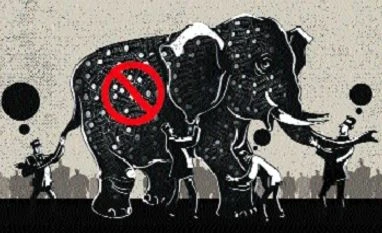The intense disruption caused by the demonetisation of Rs 500 and Rs 1,000 notes has caused a massive debate on black money over the last two weeks. But much of it has been like that story about the blind men of “Hindoostan” who went around the elephant blindfolded and could not agree on what the creature was.
What everyone has overlooked is that in the nicer democracies there are only two types of black money. One is the hidden income of honest people. Another is the income — necessarily hidden — of criminals.
But India has a third type, and it is a “type” — or “class” — because of the large numbers involved of both persons and amounts. This is the income earned by the agents of the sovereign who earn via simple extortion to do what they are paid to do. Indeed, India is possibly the only country in the world where the employees of the sovereign extort each other as well. No one is spared.
When honest people hide a portion of their incomes, no one else suffers. Even with criminals only the victims suffer. But with India’s third category, the servants of the sovereign, everyone suffers. They are exactly like a cancer. They spare no one, not even the dead at the cremation ground where they demand a bribe for dry wood.
It is perhaps because of this that people have been generally supportive of the demonetisation.
Three shades
Much of the criticism of the decision to demonetise is because people tend to think of all three types at the same time and interchangeably. While the emotion is understandable, it is not very helpful in solving the problem of flow of black money.
Much of the criticism of the decision to demonetise is because people tend to think of all three types at the same time and interchangeably. While the emotion is understandable, it is not very helpful in solving the problem of flow of black money.
Therefore, having attacked the stock of black money, and before he begins his onslaught on the flow of black money, Narendra Modi has to recognise the need for a different approach for each type. It will not be easy because he will have to use very considerable force.
More From This Section
This will have the politicians up on their hind legs, braying once again that democracy is in danger. Nothing could be further from the truth. Have no doubts: They are the main beneficiaries of black money.
As the law stands at present, it sanctions the use of considerable force only against the honest income earner who hides some part of his income because the various levies on income are so high.
Amazingly, where criminals are concerned, the government is less coercive. Many of them enjoy “protection”, some of them even being MPs and others amoral businessmen who run away when they are held to account.
To tackle black money via tax evasion by the otherwise honest, Mr Modi must, absolutely must, reduce the extent to which the government picks their pockets. Income tax, GST, stamp duties, municipal taxes and, of course, the resulting corruption — all must come down.
Since GST is going to be around 18 per cent, income tax rates must be brought down to 15 and 25 per cent. The improvement in compliance will be enormous, as it was when P Chidambaram cut income taxes in 1997.
Charity begins at home
Illustration by Ajay Mohanty
That is why, if he wants to succeed fully, Mr Modi must go after this lot first, instead of allowing them to harass the generally honest income earners because the sheer inequity of it is mind-boggling: Utterly dishonest lawbreakers are entrusted with enforcing the law!
In his stump speeches, Mr Modi often reminds us of corruption in the government. But so far he has done precious little in tackling it. In fact, he seems scared of attacking those whose salaries come from the exchequer.
To put it baldly, it is the government that enables extortion which generated vast sums of black money. It is this Mr Modi has to tackle. Otherwise, demonetisation would have been a very expensive bet which he will lose.
Besides, there will be an added bonus: The silencing of Mr Chidambaram who, if he cares to recall, made extortion by tax officials easier by offering them a percentage of the tax they were instrumental in collecting.
This opened the doors for inflated notices and subsequent “adjustment”.
)